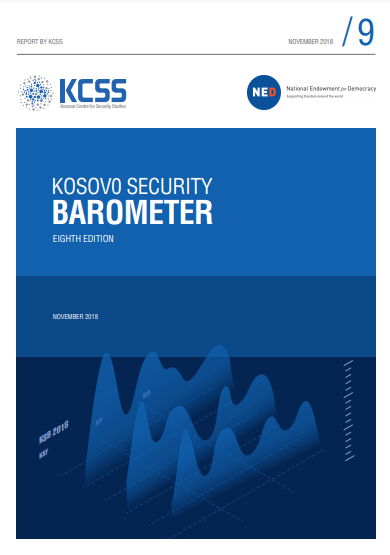23/11/2018

Kosovar Center for Security Studies (KCSS)
National Endowment for Democracy (NED)
Donika Marku
Kosovo Security Barometer (KSB) is a distinctive tool through which Kosovar Centre for Security Studies (KCSS) measures public perceptions. The eighth edition of the KSB report consists of two main chapters. The first chapter measures citizens trust toward Kosovo’s security, justice and central state institutions and the second chapter recordsc itizens perceptions regarding Kosovo’s main internal risks and threats.
Perceptions of trust in state institutions and perceptions of national threats vary with respondents’ ethnicity, gender, zone and district. Therefore, the report provides cross-tabulated data analyses in addition to general interpretation of the data which enables the audience to have a vivid picture and better understanding regarding the citizens’ trust in institutions and their perceived threats. Correspondingly, analysing the trust results based on specific areas, districts, ethnicity, gender, as well as other complementary data related to respondents, allows the audience to explore further the rationale of Kosovar citizens regarding various security and justice related issues.
Based on KSB 2018 results, key highlights follow:
• Kosovar citizens trust Security institutions much more than Justice or elected ones;
• The Kosovo Security Force remains the most trusted institution in Kosovo;
• Once again the Kosovo Security Force resulted being the most trusted institution in Kosovo;
• Trust in justice institutions continued to remain very low, even though a slight increase of trust in both judicial institutions is evident (2 percentage points);
• Central institutions such as the Assembly of Kosovo and the Government continue to enjoy low trust of citizens while trust in the Municipal administration resulted higher;
• The Kosovo Government results as the least trusted central institution in Kosovo;
• The citizens’ trust in EULEX continues to remain very low compared to KFOR, which ranks as the second most trusted institution in Kosovo.
• The Barometer showed no major differences in results considering correlation between trust and citizens living in rural and urban zones. No major differences were recorded considering districts, except Mitrovica North where trust on Kosovo institution was lower. This has also been reflected when it comes to ethnic communities where Kosovo Serbs respondents in general continue to have less trust in security and justice institutions in Kosovo.
• Women tend to have a higher trust towards justice and local institutions than men;
• The respondents perceived corruption, unemployment, organized crime as the most dangerous internal threats that Kosovo faces. It should be noted that citizens also expressed a high concern regarding partition of Kosovo and autonomy of Northern Kosovo.
• Respondents in rural areas were more concerned about these threats than respondents in urban areas.
• Kosovar Serbs feel less threatened by all measured national security threats compare to Kosovar Albanians; yet, respondents of both ethnicities perceive organized crime as a key threat.
• The security perimeter showed that respondents feel safer at home or the closer neighbourhood compared to village/town or Kosovo in general.
This report is published in the framework of the Kosovo Security Barometer Programe. Perceptions presented in this report are a summary of information gathered from respondents and it solely demonstrates how people perceive institutions. It is no way a conclusive assessment on the quality of the work of institutions subject to this study. It shall serve as an instrument to them toward addressing potential shortcomings, but also an indicator of the effectiveness of their communication with the people.
The views presented in this report are perceptions of the respondents and do not necessarily represent the views of Kosovar Centre for Security Studies. Opinions expressed in this report do not necessarily represent the views of the National Endowment for Democracy (NED).